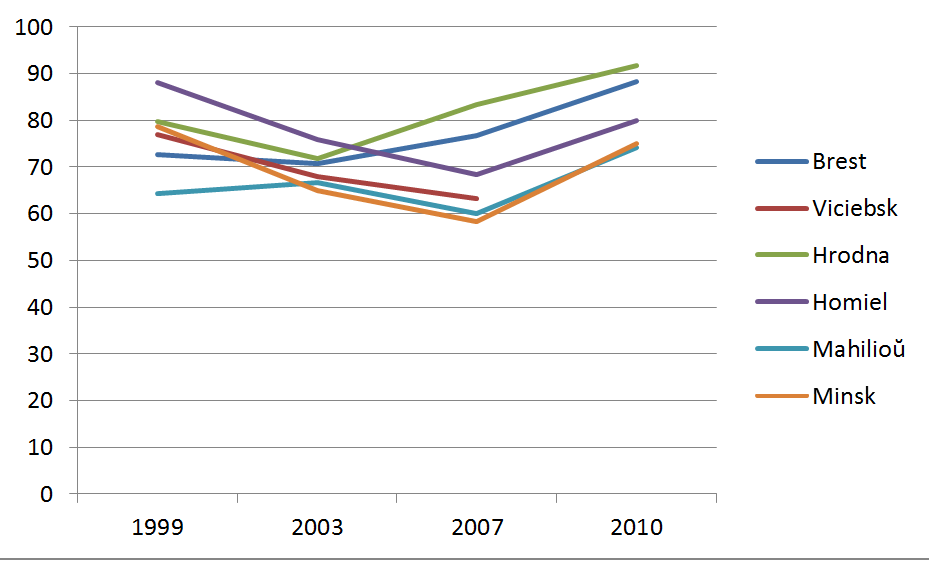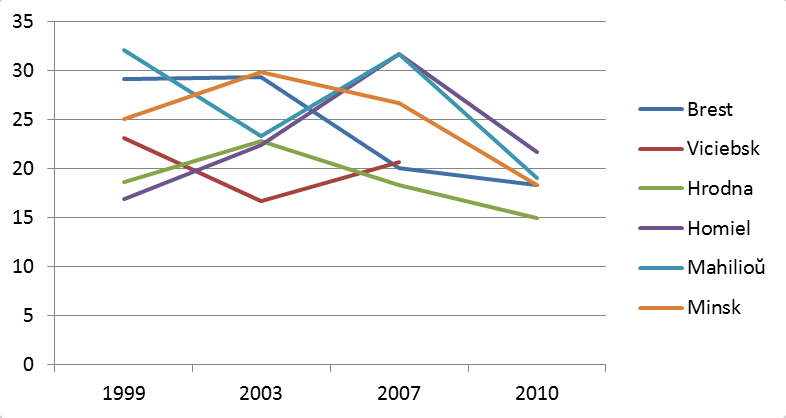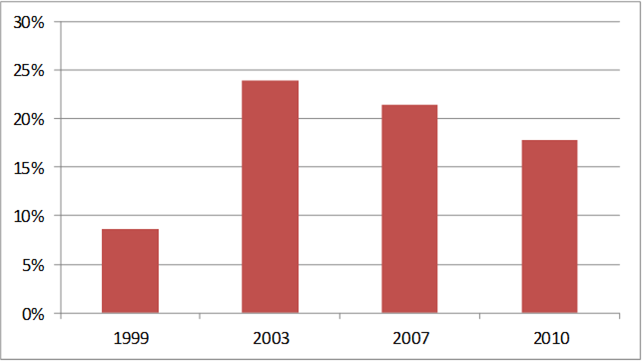Local Elections in Belarus: A Complete Farce or More than That?

On 23 March, Belarus held elections for its local councils.
During Lukashenka's rule the local elections have turned into little more than a procedural administrative task for the authorities and a minor holiday with alcohol and music for voters.
The nation's legislative bodies do not pretend to be genuinely self-governing in Belarus. The typically undemocratic practises that get MPs elected to office brings the institutions' legitimacy into question. They are often viewed as being little more than decorative institutions that exist solely to prop up a portrait of democracy in Belarus.
However, a study of local regional councils by the Institute of Political Studies ‘Political Sphere’ conducted proves this is not the case. Councils actually bring together de-facto regional elite representatives who manage regional affairs together with the state executive body.
Elections as Ritual and Holiday
On election day last week, the authorities, as is their tradition, deployed a number of makeshift cafeterias where voters could celebrate their local elections with drink and music. For most people elections are a kind of holiday when they can drink and have a little fun.
the authorities introduced a few innovations and decided to hand out presents to various categories of voters Read more
During the most recent local elections the authorities introduced a few innovations and decided to hand out presents to various categories of voters. For example, those who voted first time in their life received different gifts, including chocolate, candy, clocks and some even reported getting sausages for voting.
Electoral practises remain highly discriminatory against opposition candidates – the authorities control and manage the whole procedure of getting registered, the formation of electoral commissions and election observations. This level of control, combined with pressure on opposition parties and civil society organisations, led to a ritual that is called "elections" in Belarus.
As usual, state institutions carried out a programme of widespread pre-election day voting. The authorities typically make any voters affiliated with them vote before the elections actually took place and thus facilitate higher voter turnout rates which helps them manipulate the results.
In total, the electoral commission reports, 37% of voters utilised the early voting option. Due to the absence of any real political competition, the elections often appear stale and lack any potential alternative candidates – this time around in 88% of the constituencies only one candidate ran for office. Read more
Authorities also employ their administrative resources to leverage and facilitate a sufficient level of voter turnout. This is crucial for them, as the only thing they truly need is the physical presence of voters since all other variables can be dealt with behind closed doors.
A mass boycott could go a long way in destroying this state supported scheme, so the regime offers all kinds of gifts and enticements to attract voters that they are unable to force to commit to voting early. This time around nationwide turnout was 77%, but in Minsk only around 60% of eligibles voters came to the polls.
Meanwhile, observers reported numerous violations, but the prosecutor's office seems reluctant to give any consideration to them – the administrative machine cannot accept that any violations might take place.
Is There Any Self-Governance in Belarus?
According to Belarusian law, local government in Belarus constitutes a part of the state administrative apparatus and works in the interests of both the government and the interests of the population of that they represent. Lower levels of government are, naturally, directly subordinate to higher ones. The system of local self-government consists of the local councils and executive committees.
The councils serve as representative bodies and are elected through general elections. Most experts in Belarus see the councils as artificial institutions, which are completely subordinate to local executive committees, a part of the centralised state system.
Taking into account Belarus' electoral practises, the local councils may indeed appear to be merely a facade which the authorities use to support the fact that there is democracy in Belarus. In reality, the political power of the councils is routinely underestimated. The people who enter the councils represent the regional elite from the public sector, who, together with the executive state vertical structure, run local affairs.
Their leading positions in large government institutions alone means that they have considerable influence on the way things are run. In other words, the functions of the councils are not merely decorative, but rather play an important role in local affairs. A study of the composition of regional councils by the Institute of Political Studies ‘Political Sphere’ made in 2012-2013 proves this very fact.
Regional Councils – the Seat of State Oligarchy
In the study, researchers statistically analysed the composition of the local councils by a number of criteria. In particular, it looked at the six regional councils elected during the local elections in 1999, 2003, 2007 and 2010.
The composition of the councils by place of declared residence demonstrates that regional centres dominate the governing bodies with 40-60% of the seats, while representatives of smaller cities holding about 40% of the regional council and villages fairing less well, with only 5-15% of the overall seats.
This distribution of seats clearly does not match the proportions of population that resides in these regions. When considering age, researchers found that individuals who were between 50-60 years old hold the most seats, while the system almost completely excludes young people from local government.

When taking a look at the predominant sector of employment of deputies, the state sector steadily held across the board with about 95% of seats in the councils. Business was only able to muster a small percentage of seats. Representatives who have worked in NGOs are notably completely absent, while a few representatives of GONGOs (Government Organised Non-Governmental Organisations) like the youth organisation BRSM and several official trade unions in attempt by officials to show that civil society is adequately represented.
Economically inactive categories of the population, like pensioners, the unemployed and students are never among those found in the councils' ranks. This fact indicates that the authorities form the councils with people who already have status and influence in the regions. In other words, only people from the establishment with connections to the executive are able to make their way into the councils.

The analysis conducted by the Institute of Political Studies ‘Political Sphere’ also took a look at the positions which the elected deputies held in their previous/current organisation(s). The three primary categories were: heads of organisations, heads of units or simple workers. Heads of organisations completely dominate, and in 2010 they were between 75-90% of all the representatives elected. Deputy heads of organisations made up 8-18% of all deputies in 2010, while workers claimed only one or two seats or, often enough, no seats at all.

Deputies' previous fields of employment and their occupations were also the subject of analysis by the Institute's researchers. Representatives from public administration decreased in all councils after 2010, while managers from industry and construction has seen an increased presence in the councils since 2007.
These two trends show that the economic elite are acquiring more power at the regional level, as economic issues clearly become more important for the authorities.

Not surprisingly, males dominate all councils throughout the period assessed. There are, however, some interesting developments that the report took note of. In 1999 females held only about 8% of the seats, but in the following elections in 2003 they secured nearly 25% of the seats in the councils. Jumps in the number of women in the representative bodies prove that the authorities tried to manipulate the councils' composition to create the impression that all groups of society were represented in the councils. This very practise was widely employed in the USSR to give it more legitimacy.
The study proves that local councils in Belarus, despite their being unable to truly govern themselves, are not simply superficial institutions that serve as a facade for the regime, but rather they have a real role in regional politics and public administration.
As the heads of main regional organisations, deputies work closely with the executive committees in their areas of expertise. For the authorities these established institutional structures are beneficial as councils help in the government's efforts to promote Belarus as a democratic society, but do not actually depend on citizens' voices. For Belarusians though, the elections of so-called representatives to local councils remain an occasion to go out and have a little fun once every four years.




